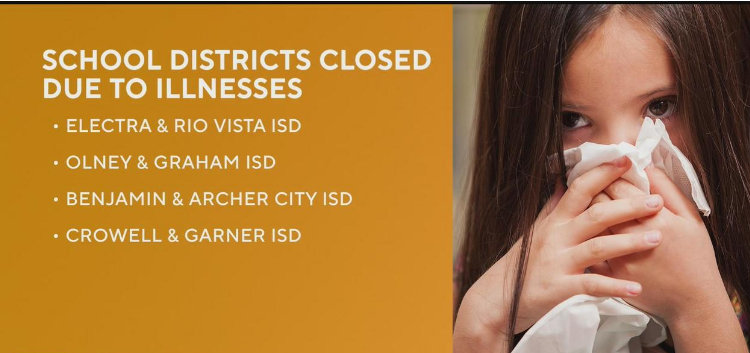Amid a surge in respiratory illnesses, several school districts in Texas find themselves grappling with a significant uptick in student and staff absences due to illnesses such as COVID-19, influenza, and RSV. The state, like many others, is experiencing an unusual spike in cold and flu cases, prompting schools to take preventive measures to curb the spread within educational institutions.
The fall and winter months traditionally mark the flu season, with cases of seasonal influenza peaking between December and February, according to the Centers for Disease Control and Prevention (CDC). However, this year’s numbers seem to be particularly high, prompting concerns among educators and health officials.
The Texas Department of State Health Services (DSHS) has introduced a Respiratory Illness Interactive Dashboard to monitor trends in COVID-19, RSV, and influenza across the state. The latest data indicates an upward trend in all three respiratory illnesses, prompting increased vigilance among school administrators.

The Olney Independent School District in Archer County was among the first to respond to the surge in illnesses. On January 22, 2024, the district announced the cancellation of classes in an effort to mitigate the spread of seasonal respiratory infections. Subsequently, multiple nearby school districts, including Crowell ISD, Benjamin ISD, Archer City ISD, Graham ISD, Chillicothe ISD, and Electra ISD, followed suit by closing their doors due to an unusually high number of illness-related absences.
Dr. Joshua Smith, Superintendent of Benjamin Independent School District, shared insights into the decision-making process. The district began monitoring respiratory illness cases on January 23, observing a rapid increase in student absences. By January 24, attendance had dropped to 70.2%, with 38 students out sick. Dr. Smith, who was also ill at the time, decided to close the district to prevent further spread.
While the Texas DSHS provides guidelines for defining a confirmed influenza outbreak in a school, such as five or more cases in one day among students or staff in a single class, sports team, or after-school group, smaller districts like Benjamin ISD may experience significant disruptions with fewer cases.
Dr. Smith emphasized that the decision to close Benjamin ISD was made based on the district’s unique circumstances rather than external factors. The district utilized the closure to conduct a thorough sanitization, partnering with a company called GermBlast for deep cleaning after the maintenance staff’s efforts.
Classes resumed on January 30, and Dr. Smith noted a positive trajectory in attendance. While some students are still recovering, the overall numbers indicate improvement. Dr. Smith stressed the importance of remaining vigilant and taking precautions to prevent future outbreaks, acknowledging the heightened awareness among teachers and staff.
The decision to close down the district was not taken lightly, but Dr. Smith expressed confidence in the positive impact of the closure, citing the improved attendance upon resuming classes. As the community navigates the aftermath of the surge in respiratory illnesses, the focus is on preventing further spread and maintaining a healthy school environment.
Read More:
- President Biden Breaks Tradition: Opts Out of Pre-Super Bowl Interview with CBS
- Unveiling the Disturbing Past of Joliet Mass Shooting Suspect in Illinois: Police Records and Video Reveal a History of Violence
- Understanding the $12,000 Stimulus: Eligibility and Application Process for California Residents
The challenges faced by Texas school districts underscore the broader impact of the ongoing surge in respiratory illnesses, prompting a collective effort to safeguard students, teachers, and staff. As the situation continues to evolve, education leaders remain committed to adapting strategies to ensure the well-being of their school communities.

